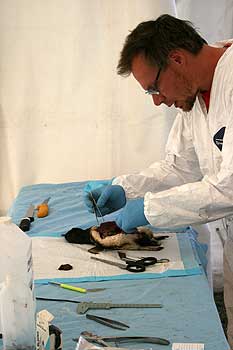Challenging task for wildlife pathologist

Wildlife pathologist Stuart Hunter has his hands full undertaking post-mortems on more than 1300 mostly dead birds recovered since the oil spill from the container ship Rena earlier this month.
From a tent set up as part of the expanding Oiled Wildlife Response Centre at Te Maunga near Tauranga, the Massey veterinarian who has specialised in pathology, has carried out daily post mortems on a variety of species of birds as well as some seal pups.
While the seals have been found to have died through natural attrition, many of the birds have been obviously oiled from the spill off the Tauranga coastline.
“I arrived here on the Monday and there were a few birds, but by Wednesday-Thursday between 500-700 birds came in. The majority were so oiled they were hard to recognise as birds.”
Each death has been individually collated and cause of death noted by Mr Hunter, who is the sole pathologist on site. The scale of the disaster can be hard to comprehend for someone whose professional role is dealing with dead animals– whether examining an oiled animal or an albatross deemed to have died of natural causes.
“It’s hard to see animals in this state but it’s also interesting, but hopefully the oil spill is a once in a lifetime thing.”
Mr Hunter, who studied for his veterinary degree specialising in pathology with Massey, has been with University’s Wildlife Health Centre at Palmerston North for two years. He previously spent four years working in North Carolina, USA.
While his background is working with more domestic animals like cats, dogs, sheep and cows, he is keen to continue working with more feral creatures.
“I’d like to stay is the wildlife area and work on some marine mammals too. This is a good chance to learn more about wildlife.”